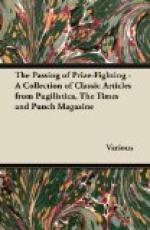Sir SIDNEY LEE pointed out that, owing to the occupation of a large part of the National Gallery, all the National Portrait Gallery, all the Tate Gallery, and all Hertford House, where the Wallace Collection is, by Government clerks, these national institutions were not open to our soldiers from the Dominions and the provinces, who might never again have the opportunity of refreshing their eyes by gazing upon some of our most beautiful possessions. In their interest alone he pleaded for the rapid conversion of the buildings to their proper ends.
Sir Yutely Taryan, K.C.V.O., speaking for his own Government Department, said that in his opinion a great deal of nonsense was talked about art, both its educational value and its power of giving pleasure. Speaking for himself, even in normal times, he would rather see a picture gallery given up to living clerks than to dead canvases. If he had his way there should be no pictures but those that stimulated people to greater activity. He had, for example, never seen any beauty in WHISTLER’S portrait of his (WHISTLER’S) mother until it was reproduced as a War-savings poster, with words scrawled across it. A few of the placards which American business men pinned up in their offices, such as, “To Hell with Yesterday,” were better than all the Old Masters.
Continuing, Sir Yutely said that he could not permit himself to accept the view that any privation was being suffered by our brave lads from overseas. From conversations that he had had with some of them he found that the only pictures that they knew anything of or cared about were those in the cinemas. From his own recollections of his only visit to the National Gallery some years ago he should say that these noble fellows were better outside that place than in. One painting that he saw there was so scandalous in its nudity that he blushed even now when he thought of it. Better far that our defenders from the Dominions should continue to walk up and down the Strand.
On the motion of the Chairman, who said that he thought the case for the Government and the continued closing of the galleries and museums had been adequately made out, the Commission adjourned sine die, and Lord HARCOURT, Sir SIDNEY LEE and Mr. WITT were left sharpening their pens.
* * * * *
[Illustration: Manager of Coliseum (Ancient Rome). “YOUR IMPERIAL MAJESTY, I REGRET THAT, OWING TO THE SUDDEN INDISPOSITION OF BIBULUS TERTIUS, HIS COMBAT WITH THE TWO NUBIAN FOREST-BRED LIONS IS UNAVOIDABLY POSTPONED. WITH YOUR MAJESTY’S KIND PERMISSION THE TURN WILL BE TAKEN BY THE WELL-KNOWN BUCOLICUS CALVUS, WHO WILL GIVE A FEW OF HIS WONDERFUL FARMYARD IMITATIONS.”]




